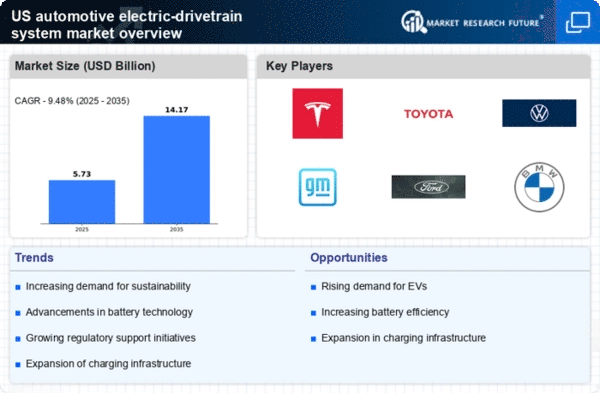Rising Fuel Efficiency Standards
The automotive electric-drivetrain-system market is experiencing a notable shift due to the implementation of stringent fuel efficiency standards in the US. These regulations, aimed at reducing greenhouse gas emissions, compel manufacturers to innovate and adopt electric drivetrains. As a result, the market is projected to grow at a CAGR of approximately 15% over the next five years. This regulatory environment not only encourages the development of more efficient electric drivetrains but also drives investment in research and development. Consequently, automakers are increasingly integrating advanced technologies into their electric drivetrains to meet these standards, thereby enhancing overall vehicle performance and sustainability.
Consumer Shift Towards Electric Vehicles
The automotive electric-drivetrain-system market is witnessing a significant consumer shift towards electric vehicles (EVs). This trend is driven by increasing environmental awareness and the desire for sustainable transportation solutions. Recent surveys indicate that approximately 60% of consumers in the US are considering purchasing an electric vehicle as their next car. This growing demand is prompting automakers to expand their electric drivetrain offerings, leading to a more diverse range of models available in the market. As consumer preferences evolve, the automotive electric-drivetrain-system market is likely to experience robust growth, with manufacturers focusing on developing innovative and appealing electric drivetrains to meet this demand.
Increased Investment in EV Infrastructure
The automotive electric-drivetrain-system market is significantly influenced by the growing investment in electric vehicle (EV) infrastructure across the US. With federal and state governments allocating substantial funds for charging stations and grid enhancements, the accessibility of electric vehicles is improving. Reports indicate that investments in EV infrastructure could exceed $7 billion by 2026, facilitating the adoption of electric drivetrains. This development not only supports consumer confidence in electric vehicles but also encourages manufacturers to expand their electric drivetrain offerings. As infrastructure improves, the automotive electric-drivetrain-system market is likely to witness accelerated growth, driven by enhanced consumer convenience and reduced range anxiety.
Technological Innovations in Battery Technology
The automotive electric-drivetrain-system market is poised for growth due to rapid advancements in battery technology. Innovations such as solid-state batteries and improved lithium-ion technologies are enhancing energy density and reducing charging times. These developments are crucial, as they address key consumer concerns regarding range and efficiency. The market for electric drivetrains is expected to benefit from these technological improvements, with battery costs projected to decrease by 30% over the next few years. As battery performance improves, manufacturers are likely to invest more in electric drivetrains, leading to a broader range of electric vehicle options for consumers and a more competitive market landscape.
Government Incentives for Electric Vehicle Adoption
The automotive electric-drivetrain-system market is significantly impacted by government incentives aimed at promoting electric vehicle adoption. Federal tax credits, state rebates, and other financial incentives are encouraging consumers to consider electric vehicles. These incentives can reduce the effective purchase price of electric vehicles by up to $7,500, making them more attractive to potential buyers. As a result, the market is expected to expand as more consumers take advantage of these benefits. Furthermore, these incentives are likely to stimulate manufacturers to invest in electric drivetrains, enhancing their product offerings and contributing to the overall growth of the automotive electric-drivetrain-system market.
















